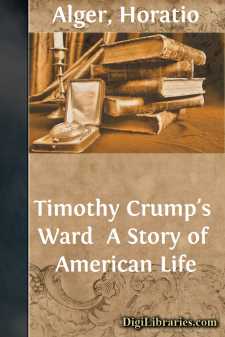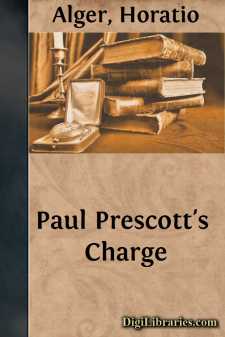Categories
- Antiques & Collectibles 13
- Architecture 36
- Art 48
- Bibles 22
- Biography & Autobiography 815
- Body, Mind & Spirit 144
- Business & Economics 28
- Children's Books 18
- Children's Fiction 14
- Computers 4
- Cooking 94
- Crafts & Hobbies 4
- Drama 346
- Education 58
- Family & Relationships 59
- Fiction 11835
- Games 19
- Gardening 17
- Health & Fitness 34
- History 1378
- House & Home 1
- Humor 147
- Juvenile Fiction 1873
- Juvenile Nonfiction 202
- Language Arts & Disciplines 89
- Law 16
- Literary Collections 686
- Literary Criticism 179
- Mathematics 13
- Medical 41
- Music 40
- Nature 180
- Non-Classifiable 1768
- Performing Arts 7
- Periodicals 1453
- Philosophy 65
- Photography 2
- Poetry 896
- Political Science 203
- Psychology 44
- Reference 154
- Religion 515
- Science 126
- Self-Help 85
- Social Science 83
- Sports & Recreation 34
- Study Aids 3
- Technology & Engineering 60
- Transportation 23
- Travel 463
- True Crime 29
Horatio Alger
Horatio Alger was a prolific 19th-century American author known for his rags-to-riches stories that embodied the American Dream. His books, such as "Ragged Dick" and "Struggling Upward," featured young protagonists who achieved success through hard work, determination, and moral integrity. Alger's works had a significant impact on American culture, promoting the idea that anyone could rise from humble beginnings to achieve greatness.
Author's Books:
Sort by:
by:
Horatio Alger
CHAPTER I. INTRODUCES THE CRUMPS. IT was drawing towards the close of the last day of the year. A few hours more, and 1836 would be no more. It was a cold day. There was no snow on the ground, but it was frozen into stiff ridges, making it uncomfortable to walk upon. The sun had been out all day, but there was little heat or comfort in its bright, but frosty beams. The winter is a hard season for the...
more...
by:
Horatio Alger
CHAPTER I. THE YOUNG RIVALS. The main schoolroom in the Millville Academy was brilliantly lighted, and the various desks were occupied by boys and girls of different ages from ten to eighteen, all busily writing under the general direction of Professor George W. Granville, Instructor in Plain and Ornamental Penmanship. Professor Granville, as he styled himself, was a traveling teacher, and generally...
more...
by:
Horatio Alger
CHAPTER I. HARRY WALTON. "I am sorry to part with you, Harry," said Professor Henderson. "You have been a very satisfactory and efficient assistant, and I shall miss you." "Thank you, sir," said Harry. "I have tried to be faithful to your interests." "You have been so," said the Professor emphatically. "I have had perfect confidence in you, and this has...
more...
by:
Horatio Alger
Nothing To Eat. Not by the Author of "Nothing to Wear." The Argument THOUGH famine prevails not at all in the city;Though none of starvation have died in the street;Yet many there are now exciting our pity,Who're daily complaining of nothing to eat. The every-day cry and the every-day fare,That's every day heard where the Livewells are dining,Is nothing to eat, or else nothing to...
more...
by:
Horatio Alger
CHAPTER I TWO SCHOOL FRIENDS Two boys were walking in the campus of the Bridgeville Academy. They were apparently of about the same age—somewhere from fifteen to sixteen—but there was a considerable difference in their attire. Herbert Grant was neatly but coarsely dressed, and his shoes were of cowhide, but his face indicated a frank, sincere nature, and was expressive of intelligence. His...
more...
by:
Horatio Alger
CHAPTER I. A CANDIDATE FOR THE POORHOUSE. "As for the boy," said Squire Pope, with his usual autocratic air, "I shall place him in the poorhouse." "But, Benjamin," said gentle Mrs. Pope, who had a kindly and sympathetic heart, "isn't that a little hard?" "Hard, Almira?" said the squire, arching his eyebrows. "I fail to comprehend your meaning."...
more...
by:
Horatio Alger
CHAPTER I AROUND THE BREAKFAST TABLE "Well, wife," said Mr. Benjamin Stanton, as he sat down to a late breakfast, "I had a letter from Ohio yesterday." "From Ohio? Who should write you from Ohio? Anyone I know?" "My sister, Margaret, you remember, moved out there with her husband ten years ago." "Oh, it's from her, is it?" said Mrs. Stanton, indifferently....
more...
by:
Horatio Alger
CHAPTER I. MARK NELSON'S FAMILY. "I wish I could pay off the mortgage on my farm," said Mark Nelson soberly, taking his seat on the left of the fireplace, in the room where his wife and family were assembled. "Have you paid the interest, Mark?" asked his wife. "Yes; I paid it this afternoon, and it has stripped me of money completely. I have less than five dollars in my...
more...
by:
Horatio Alger
CHAPTER I THE MINISTER'S SON "I wish we were not so terribly poor, Grant," said Mrs. Thornton, in a discouraged tone. "Is there anything new that makes you say so, mother?" answered the boy of fifteen, whom she addressed. "Nothing new, only the same old trouble. Here is a note from Mr.Tudor, the storekeeper." "Let me see it, mother." Grant took a yellow envelope...
more...
by:
Horatio Alger
SQUIRE NEWCOME. "HANNAH!" The speaker was a tall, pompous-looking man, whose age appeared to verge close upon fifty. He was sitting bolt upright in a high-backed chair, and looked as if it would be quite impossible to deviate from his position of unbending rigidity. Squire Benjamin Newcome, as he was called, in the right of his position as Justice of the Peace, Chairman of the Selectmen, and...
more...











